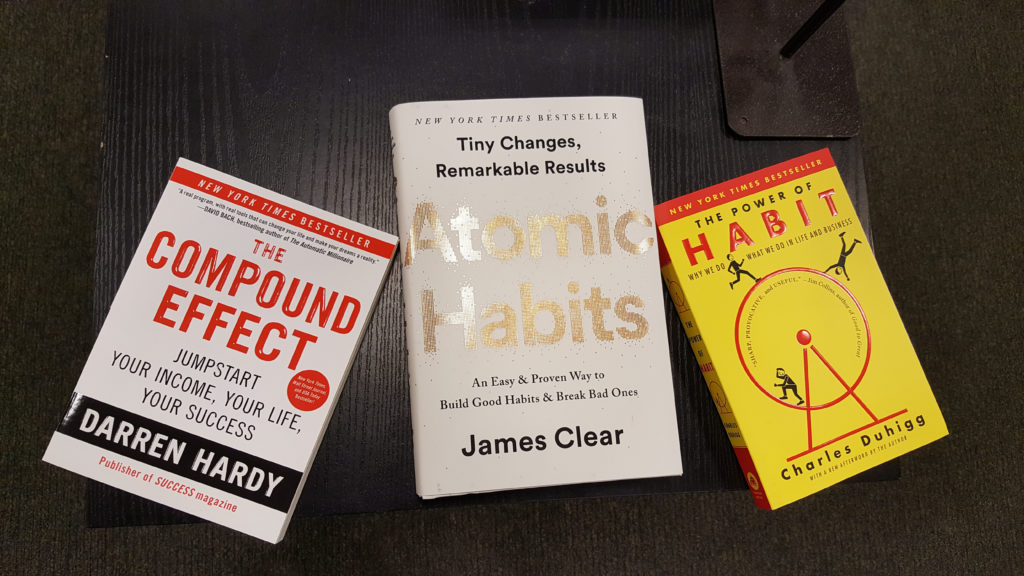
Habits can potentially be our best friends. Of course, we all have friends that will either push us to get things done or encourage us to relax and binge-watch the latest Netflix series with them when we have a project due within the next 48 hours. We love them both, but it’s important to distinguish when to hang out with one and when to pay more attention to the other. That’s where developing good habits become super important.
This blog has affiliate links. This means that, at no extra cost to you, if you so choose to participate in some of the learning opportunities here, we at Kyrabe Stories may receive a commission as gratitude from the partnering companies. Thank you sincerely for your support and for your desire to learn and grow! I hope you enjoy the blog!
Know what it is that you want to do and WHY you want to accomplish it!
Have you ever given yourself a New Year’s Resolution then forgot about it within a month (my “goal” to drink more water each day for a year ended maybe two weeks in after finally drinking a Vanilla Coke). It’s not enough to just say that we want to do something. We have to have a purpose for wanting to do it. We need a long-term drive to push us through those short-term discouragements. Our old habits will try to tell us it’s not working out. Developing good habits will encourage us to figure out how to make it work.
Set SMART goals and developing good habits around them!
Many of us may have heard this term before, but it’s okay if this is your first time seeing this. SMART is an acronym for Specific, Measurable, Attainable/Achievable, Relevant and Time-Bound.
Specific
Try not to be general with your goal and say “I’ll drink more water” or “I’ll work out more”. Technically, just drinking a tiny cup full of water or walking to the donuts shop up the street could check these items off our “I did it!” list. Write out your goals where they are clear and precise.
For example, “I’ll drink more water” might become, “Whenever I wake up, I will drink at least 8 ounces of water before I get dressed for work.” or “I’ll work out more” becomes, “every night before I take a shower or go to bed, I will do ten minutes of yoga.” Be specific of what you want to do in order to initiate the habit of actually doing what needs to be done.
Measurable
We need to be able to track our progress. In the beginning, it’s not going to look like we’ve made that much of a change. As humans, we like immediate and accurate results. If we order fast food, we expect it to be delivered, well, fast. If our GPS says we’ll get somewhere in 20 minutes, we are watching the clock if not racing it. Unfortunately, our habits and the goals connected to them will not happen instantaneously. It’ll be a slow-moving effect, so much so that we may feel like we’ve made no progress at all. That’s why making a goal measurable is important. Small progress is still progress!
Attainable / Achievable
The goal needs to be challenging, but just a little farther out from a comfortable reach. If you’ve never played chess a day in your life, then it probably wouldn’t be realistic to say that your goal is to compete in the top rankings of the International Chess Tournament next month. That skill-set might take years to master. However, you can set a realistic yet challenging goal of learning the purpose of each piece and participating in a beginner or intermediate game by the end of the month. Work up from there.
Relevant
Be honest with yourself. There’s a saying that goes “knowledge is power”. This is partially true. The more accurate statement is “knowledge is potential power” meaning that the knowledge is only useful if we actually…you know…use it!
I once spent two weeks watching tutorials on Lynda (now called LinkedIn Learning) because I was interested in the User Experience Learning Path that was recommended to me. Was it packed full of useful information? Heck yeah! Did I use any of the information immediately? Not at all. Do I remember anything from the tutorial? Barely. I watched it over three years ago and have yet to apply any of it into my own projects.
The information itself was valuable, but because I had no use of it at the moment and have forgotten what I’ve learned since then, the time learning it was wasted. Choose wisely what is relevant to learn now in order to reach your immediate goals.
Time-Bound
Have you ever had a project or paper assigned, forgot about it, then realized that the due date was that week? Did you not crank that assignment out as if your life depended on it? Deadlines have the power to make us do incredible things in an established amount of time. If we’re given a month to do it, then guess what…it’ll take a month to do it. But if we’re given a week to do it, it magically gets done in a week!
Give yourself deadlines and do not compromise them with yourself unless absolutely necessary! “I forgot” does not count! Since I decided to become a blogger, my task is to release a new blog every week, three minimum each month but only if I released other material such as YouTube vlogs to compensate for content creation. My blog “Things to Consider Before Pursuing a Career Opportunity” was written half-haphazardly in a day and edited in two because I panicked for procrastinating to write for the first whole week of April. Time-bound goals will help keep you on track.
Start small.
From James Clear’s book Atomic Habits, he explains that small changes can lead to bigger results, but beginning with big changes can tire out and discourage us. As I mentioned earlier with my failed dedication to water, of all things…I made an extreme change to my sugar habit to where when I finally caved to my sugar craving, I had no motivation to go back to bland water. Then I tried a different method: I traded a few of my sodas (not all like last time) with sparkly water.
By starting with a smaller, more tolerable change, it helped me to control and alter my bad habits.
Complimenting this, The Compound Effect by Darren Hardy goes more in-depth in explaining how small changes in our daily lives can lead to massive results. One of my favorite stories referenced in this book is the effect of the compounding penny. It’s fairly simple to calculate on a sheet of paper to see the results for yourself, but the theory is for a penny to double its worth each day for thirty days. By day two, it’s worth $0.02, day five it’s worth $0.16, day ten it’s worth $5.12, and so on. The results of the penny’s compounding effect are miniature in the beginning, almost unnoticeable if you graph it out, but with patience that single penny can grow to be worth over five million dollars by the thirty-day mark!
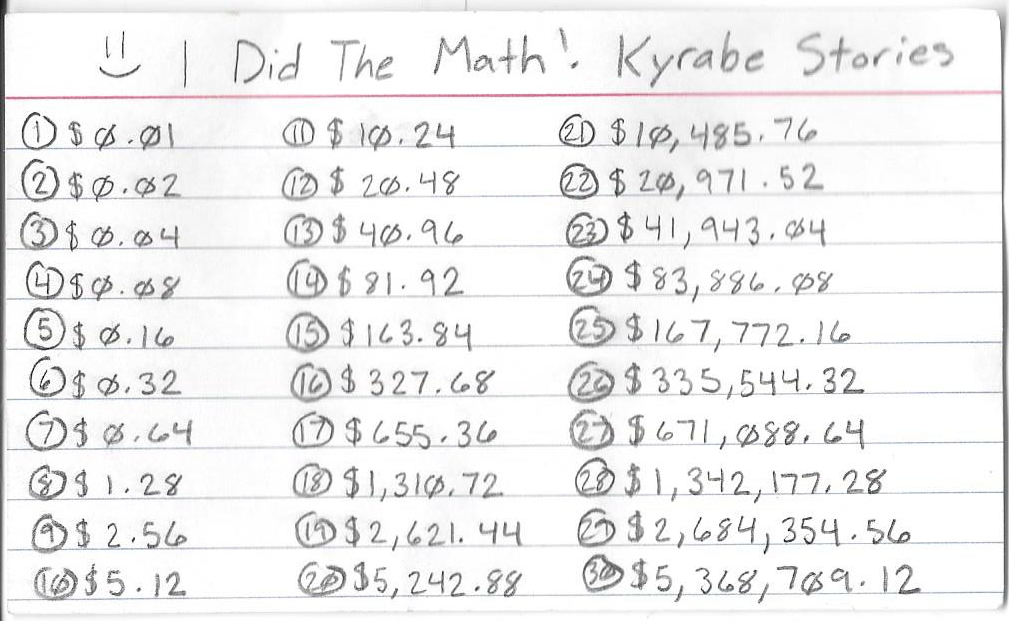
This is a compressed example of how something small can grow into something big. It may take months, or even years to see results in our own lives. The outcome, however, can be phenomenal in the long run! Whether it’s becoming fluent in a new language by learning a new word a day or by mastering a new skill by just starting with a simple hobby today, just start small!
Apply this exercise to anything to build beneficial habits. If you want to read more, just do a page or two a day and work up to a full chapter. Want to exercise more? Do a small lap around your house or apartment first, then increase the distance over time. If you want to start writing stories, start off with one sentence of topics that interest you (this helps me with blog ideas). Start small, and the results will grow over time.
Understand the power of habits.
I mentioned earlier how our habits can be our best friends, but they can also become our worst enemies if we lose control of them. For example, it’s not exactly dangerous to have a habit of getting a cheap lottery ticket every Saturday when we stop to get gas. We’ll win some; we’ll lose some. Oh well. It is dangerous to have a habit of stocking up on lottery tickets every day because we feel like the next one will be “the one” to make up for the others.
In order to take advantage of the impacts that developing good habits can have on us, I believe that it’s important to understand the psychological power that habits. Either good or bad, it’s simple to develop these habits without us even realizing it. For this, I recommend The Power of Habit by Charles Duhigg. When we dive deep into understanding why we do certain things, we give ourselves the power to overcome bad habits. We can then trade them for better ones over time.
Book Recommendation Summary
Using the Audible app during my travels, I do my best to listen to as many books as I can. For the topic of habits, these three have been the most impactful to me (that I’ve read so far) and are the ones that motivated me to write this blog. You can obtain your own copy in the links below!
Now let’s hear from you!
For developing good habits, did you have to change a bad one? If so, how did you do it? Please share your story in the comments! If you think a friend will find this blog helpful, please share it. If you’d like to receive more stories like this, please subscribe to our newsletter!
And remember to just live your life one story at a time!
Take care,
Kyndall Bennett from Kyrabe Stories
Related Post
Analysis Paralysis- 5 Ways to Overcome It!
60 Comments
Leave a Reply
You must be logged in to post a comment.
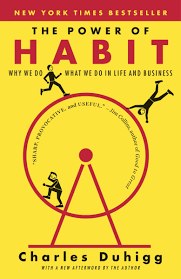
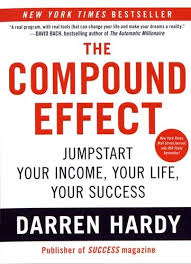
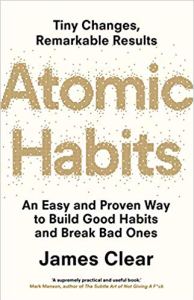

[…] us stay on track. For more book recommendations on how impactful habits can be, check out our blog, “Developing Good Habits to Reach our Goals.” […]
I loved the Compound Effect. It taught me that it does not always take big steps to reach your goals, it can be done taking smaller steps that will compound into something bigger. It is less overwhelming when you think of it that way.
It really is! I’m guilty of overthinking things, so I have to keep track of my small progress so that I don’t get stress about “assumingly” going nowhere.
LOVE this!! I tend to do this every single year…and what I have noticed is I create the same New Year’s Resolutions each year, which means I never went through with them the year before. You provided wonderful information on how to make our goals a little less “overbearing” and easy enough to want to continue with them. Thank you! Water has been a huge goal of mine this year =)
Thank you and same here! Something that helped me was starting off with sparkly water. Granted, it’s not always the best-tasting thing in the world, but it did help me lower my soda intake surprisingly.
I haven’t read any of these but am going to add them to my list. I am fascinated with how habits work.
I truly believe these books will help with that learning process. Any will be good to start with, but I would recommend “The Power of Habit” to gain an understanding of the cue-routine-reward cycle which will, in turn, help you identify which habits are going to help you the most.
I so need to be better about goal setting! Thank you for the book recommendations!
No problem! Personally, I keep a checkpoint list of small goals on my wall like “10/15/20 blogs”, “100,150,250 subscribers”, etc. then date whenever I reach a checkpoint. That way whenever I’m feeling discouraged about “not making any progress”, I can look at the checkpoints and see that small progress is STILL progress!
That is some great advice. My husband is trying a similar approach, but using $1 rather than a penny.
I would love to hear how his journey goes in the future! Since everyone is unique, there’s going to be countless ways to build up a good habit!
I used to show my math students that one. I’d ask them if they would rather have a penny doubled each day for a month or a million dollars. They usually chose the million dollars! Your post is a great reminder about habits. My worst habit is to be reactive to stress instead of responding to stress. It’s been a hard one to break but very worthwhile!
I’ve been following some of your journey on your blog and I can see how stress would be a huge contributor. You’ve done a wonderful job with sharing your story, and I think that’s a good habit you’ve developed to vent out your stress in writing, even if the edits do not display the overall heaviness. ❤
I have not read any of these three books, but you summerize the goal stting so well! I love this type of books. Will definitely check them out. Thanks for the review!
Thank you for checking out the blog! I hope the books help if you decide to give them a go!
I’ll add these to my reading list! Thanks!
Thank you for visiting the blog! ❤
I enjoyed the Compound Effect and love that you took the time to actually do the math! That just makes me happy 🙂 I want my kids to read that book as soon as they are mature enough to make it through.
I truly wish my high-school assigned books like these to me for summer reading! Some of the classics I enjoyed, but others I literally just accepted my fate of potentially failing a test on the book months before the class had even begun.
My problem is that I do set goals, but than I don’t achieve them. I will write them down and post them on the wall in my office. Two months later, I’ll see the post, take it down and toss it. I definitely need to take more control and follow through. Maybe one goal at a time, be very specific, and maybe stick it on the front of my computer, so I can’t turn it on and I’m forced to see it. Maybe I’ll just wait for your procrastination article. 🙁
One trick I use is to create a checkpoint list. This list is to have SMALL GOALS ONLY! Whenever you make one checkpoint, you date it then add another checkpoint. For example, I was stressing about having a small following on social media to support my blog, so for Twitter, I set a goal for 25 followers. When that mini-checkpoint was made, I dated it then set a new goal to 50 followers. Same with my blogs: 5 published-date, 10 published-date, 15-date, 20-in progress. This exercise is a visual representation that small progress is STILL progress! Whatever sticky-note you have up now, set a mini-checkpoint for it (I’m serious, make it SMALL). If your goal is to finish a book, set a checkpoint to finish 10 pages or Ch.1. Do not write the next checkpoint until you’ve accomplished the current one. ❤ I hope this helps!
I haven’t read these yet, but plan to definitely look them up. I love Audible as well as renting audio books from my local library. One I read recently was the Magnolia Story by Chip and Joanna Gaines. Great story!
I just added “The Magnolia Story” to my Audible wishlist! Thanks for the recommendation!
Excellent info, especially defining what SMART goals are. I am hearing a lot about those as a teacher these days. Thank you for sharing!
No problem! Honestly, I had to look up an animated infographic video before I officially understood how to set a SMART goal up!
I love this growth mindset. I will check some of these out. The Power of Habit looks like it’ll be my first read. Thanks a bunch!
I do recommend starting with that one! It explains the cue-routine-reward cycle and will truly help identify where we need to make adjustments in our lives. The other two books will explain more in-depth HOW to make those adjustments.
Great post! I need to be better about setting SMART goals. I have not read any of those books. Thanks for the recommendations.
The SMART goals take a little practice. I suggest having a trusted friend read over yours and agree to hold you accountable if you’re up for the challenge. ?
Ooh, the SMART method. I admit that I had forgotten about that one. I do like the be specific aspect. Sometimes I will even tell my husband what is my goal for the day so that he can help keep me accountable.
I had my fiance hold my manga hostage until I completed my blog for the week! I hated myself for making that arrangement in order to meet my SMART goal, but it worked, darn it.
Oh this is perfect timing! Atomic Habits is on my list of books to get! I actually used to set a whole bunch of goals for myself every day and then would beat myself up for not completing them. Now I have three daily goals and I do them every day – they set me up for success and I get so much more completed.
That’s awesome that you accommodated your list to smaller bites so that more can be accomplished! I also recommend making a checkpoint list too! Every time you accomplish a task or goal, place the date beside the “checkpoint.” That way during weeks that you feel like you haven’t accomplished much, you can look at the checkpoints and see where your small accomplishments are at!
I especially liked the line about replacing bad habits with good ones. I used that a lot during my career as a Nurse Practitioner. I used it at all ages, but specifically working with folks who wanted to quit smoking. Find something you like to do (or really want to do) and use it to replace the habit. Nicotine is one thing, but folks really enjoy the conraderie of a smoke break with co-workers, or the time to sit and relax and smoke after dinner, etc. You get the idea. The starting point was always helping them list out all the enjoyable moments associated with the bad habit. It’ll take about 6 weeks to replace a habit. We’d set weekly goals and check ins to get to that 6 week mark.
That’s awesome that you set weekly goals instead of just the overall goal! I wish I had read these books whenever my fiance was quitting smoking. Fortunately, we followed many of the methods like providing him those green peppermints to replace the menthol without realizing that was a key factor, but there were so many other things we could have done to make his transition to a new habit a lot easier. I’m proud of him for accomplishing the task though, even if we did take the rougher route!
I have not read the books, but I do follow Darren Hardy and watch his videos. These are really great lessons in life!
Oooooh! I’ll have to check out the videos! Thank you!
I really love the Power of Habits book. It really made me think. I love your post, and starting small is key, and it is powerful.
Thank you! I just finished listening to that one again on Audible. Now even I have to work on fixing my routines to cater to the goal!
I never thought of the SMART acronym. And I love how we can work on our habits! Great info.
It took me a while to get used to the SMART goal setting! I still fumbled at times, but it helps to start small and work up from there!
I love the compound effect. I have will add these others to my read list. Thanks!
Thank you for stopping by, Shirley!
Great post on setting smart goals I haven’t read any of these books, but I have watched many Darren Hardy vids on YouTube. I’ll add these to my must read list, thanks for sharing 🙂
Thank you, Angela! I’ve seen Darren Hardy’s videos mentioned a few times, so I’ll have to go check those out!
I love creating new habits! I swear it creates new brain cells too! Lol
? There have been studies of brain scans showing how new habits seem to “overwrite” the patterns shown in older scans! It’s like the brain learns to rewire itself based on our habitual routines!
I LOVE the example of the penny! I’m such a procrastinator, and sometimes just don’t prioritize things in the right order, and it can make things so stressful at times! I try so hard to get better habits to reach my goals faster, but I think it is something I will just have to work on continuously. I really liked the break down in this post and the ideas. I think I will have to pick up one of those books for when we go on our next vacation!
Thank you! I recommend “The Power of Habit” first mainly because it breaks down how strong of an impact, positively or negatively. a habit can have. It’s filled with many short story examples to keep the reader entertained and curious.
Great info. I’ve always loved the SMART acronym for goals. And I’ve not read any of those books. I’ll add them to my book list.
Thank you, Cindy! I truly hope that the books are helpful!
Great post!! I’ve never seen the SMART goals used with something other than education. Thanks for sharing!
That’s good that it’s applied to education too. I wish I had known about the SMART method back in high school. I think I would have accomplished a lot more.
These look great. My husband is always looking for books like these to listen to when he’s traveling.
They are available on Audible!? It’s the main way I’ve been able to fit books into my schedule!
I really needed to hear this today as I often become impatient looking for instant results in so many areas of my life! Thanks for the reminder!
No problem! I think that we all feel that way now and then. It can become difficult sometimes to remember that small progress is still good progress. ?
Ah, yes – the S.M.A.R.T method. Many people swear by this…I just haven’t had the discipline to put it into action yet.
To be honest, I’m still working on it myself! I had to set some for my job as a Multimedia Designer, but to truly understand how to use the S.M.A.R.T method “effectively”, I had to set smaller goals for my blog like “Publish 3 posts with at least 1000 words minimum by the end of each month.” This allowed me at least one week of retaliation in case I’m late on a post (like for this month ?) but is still enough to provide a challenge around my full-time position. My best advice would be to start by figuring out ONE THING that you wish to accomplish next (a new affiliate partnership, learning a new software, social media management, etc.), set small goals for that first, then gradually scale upward once your goals become “too easy”.
[…] P.S. For more helpful tips, check out “Developing Good Habits to Reach our Goals.“ […]